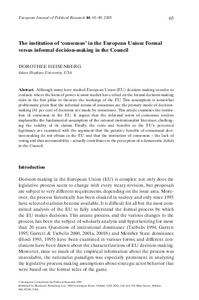The institution of consensus in the European Union: formal versus informal decision-making in the Council

European Journal of Political Research
2005
44
1
65-90
decision making ; EU Council ; European Union
European Union
https://doi.org/10.1111/j.1475-6765.2005.00219.x
English
Bibliogr.
"Although many have studied European Union (EU) decision-making in order to evaluate where the locus of power is, most studies have relied on the formal decision-making rules in the first pillar to theorize the workings of the EU. This assumption is somewhat problematic given that the informal norms of consensus are the primary mode of decision-making (81 per cent of decisions are made by consensus). This article examines the institution of consensus in the EU. It argues that the informal norm of consensus renders implausible the fundamental assumption of the rational institutionalist literature, challenging the validity of its claims. Finally, the costs and benefits to the EU's perceived legitimacy are examined with the argument that the putative benefits of consensual decision-making do not obtain in the EU and that the institution of consensus - the lack of voting and thus accountability - actually contributes to the perception of a democratic deficit in the Council."
Digital
The ETUI is co-funded by the European Union. Views and opinions expressed are however those of the author(s) only and do not necessarily reflect those of the European Union or the ETUI.